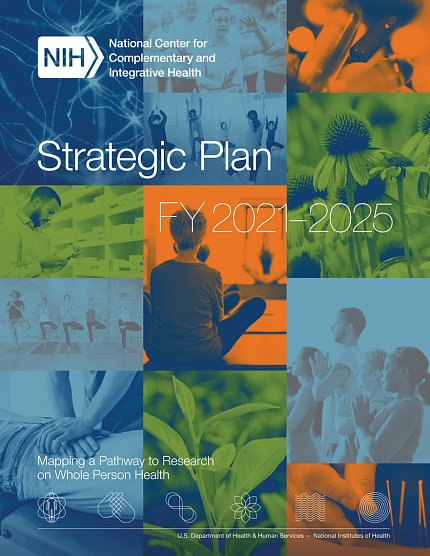NCCIH Strategic Plan Focuses on ‘Whole Person Health’

In the current health care system, we tend to think about disease one organ system at a time. But a new strategic plan by NCCIH considers multiple factors that promote either health or disease, and focuses on restoring health, promoting resilience and preventing diseases across the lifespan.
NCCIH recently released its strategic plan for 2021-2025, Mapping a Pathway to Research on Whole Person Health. The plan builds on the center’s current activities in research and information dissemination while advancing new strategies and ideas.
“Whole person health” refers to helping individuals improve and restore their health in multiple interconnected domains—biological, behavioral, social and environmental—rather than just treating disease. Research on whole person health includes expanding the understanding of the connections between these various aspects of health, including connections between organs and body systems.
The framework of whole person health places health and disease on a spectrum. On this path, many factors, including one’s biological makeup; some unhealthy behaviors, such as poor diet, sedentary lifestyle, chronic stress and poor sleep; as well as social aspects of life—the conditions in which people are born, grow, live, work and age—can lead to chronic diseases of more than one organ system. On the other hand, self-care, lifestyle and behavioral interventions may promote “salutogenesis” or the process by which an individual moves from a less healthy to a healthier state, involving the whole person.
“Currently, patient care focuses on diagnosing and treating individual diseases and not as much on protecting and restoring overall health. This is largely an unknown area,” said NCCIH director Dr. Helene Langevin. “Integrative thinking and a study of networks at all levels have been well established in other scientific fields, such as ecology and systems biology, and now medicine is starting to catch up. This presents many exciting opportunities for NCCIH to advance basic and clinical research, patient care and public health, both on our own and through collaborations.”
A whole person concept has existed for centuries in many traditional medical cultures, as reflected in practices such as meditation, yoga, acupuncture and herbal medicine.
“The concept of whole person health is so important now,” Langevin added, “as we live in a time of convergent complex crises such as Covid-19, the opioid epidemic, the pain crisis, the obesity epidemic and climate change.”
The objectives in NCCIH’s plan are to advance fundamental science and methods development; advance research on the whole person and on the integration of complementary and conventional care; foster research on health promotion and restoration, resilience, disease prevention and symptom management; enhance the complementary and integrative health research workforce; and provide objective evidence-based information on complementary and integrative health interventions.
Ten priority research topics in the plan reflect public health needs, scientific promise, amenability of those topics to rigorous scientific inquiry, their potential to impact health care practices and their relationship to use and practice.
Read the plan at https://www.nccih.nih.gov/about/nccih-strategic-plan-2021-2025.
